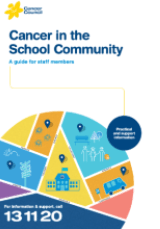- Home
- Cancer Information
- Schools and teachers
- Cancer in the school community
- Talking about cancer in schools
- Talking to someone with cancer
Talking to someone with cancer
People often say they don’t know how to talk to someone with cancer, and they feel lost for words.
The tips below can guide you, but the best advice is to just be yourself and try not to worry about whether you are saying the right thing. Saying something is often better than saying nothing because it acknowledges what is happening.
| Listen and let them lead the conversation | If the conversation stops, it’s not necessary to fill in the gaps. Simply being there can be just as important as talking. They may also want to talk about other things rather than having cancer dominate every conversation. |
| Acknowledge their feelings | It’s okay for someone to feel sad or angry about their cancer diagnosis, so don’t try to change their feelings and don’t tell them to be positive. Let them cry or express themselves as they wish. |
| Avoid giving advice | Even if you have been in a similar situation, it is best not to tell the person what to do or that you know exactly how they feel. Try to use phrases like, “That sounds really difficult”, or, “You’re going through so much.” |
| Enjoy a laugh | People living with cancer want to talk about other things too. Not every conversation has to revolve around their diagnosis. Students, especially, see school as an opportunity for normality and routine. |
| Offer practical support | People overwhelmed by a cancer diagnosis often receive many open-ended offers of support (such as, “How can I help?”), but may prefer specific offers – for example, “I was thinking of organising some meals for you – would that be okay?” or “If Meg’s finding her bag a bit heavy, she can leave some of her books at school if she likes.” |
| Invite them places | If you used to eat lunch in the staff common room or sit together on playground duty, continue to ask the person along. If you think they are too ill, suggest another activity or join them where they are comfortable. |
Students may find it difficult to talk to a peer with cancer. Find out how you can guide them in Talking to a classmate with cancer.
Ways to provide practical support
- Go grocery shopping
- Mind children or pets
- Help with cleaning or laundry
- Do some gardening
- Make dinner
- Drive to treatment
- Meet for coffee.
Simply knowing that people are thinking of you helps to ease the isolation and anxiety.
– Read more of Genevieve’s story
→ READ MORE: Respecting privacy
Podcast: Explaining Cancer to Kids
Listen to more episodes from our podcast for people affected by cancer
More resources
Claire Tobin, Principal Medical Advisor, Department of Education and Training, VIC; Dr Antoinette Anazodo, Paediatric and Adolescent Oncologist, Sydney Children’s Hospital and Prince of Wales Hospital, Director of The Sydney Youth Cancer Service, and Conjoint Senior Researcher, University of New South Wales, NSW; Lisa Barrow, Clinical Nurse Educator, Children’s Cancer Centre, Royal Children’s Hospital, Melbourne, VIC; Margo Bulic, Psychosocial Support Worker, CanTeen, ACT; Amber Copeland, 13 11 20 Consultant, Cancer Council Queensland; Donna Drew, Clinical Nurse Consultant, Paediatric Oncology/Palliative Care, Kids Cancer Centre, Sydney Children’s Hospital, Randwick, NSW; Allesha Fecondo, Education Consultant, Victorian Paediatric Rehabilitation Service, and Education Liaison, Ronald McDonald Learning Program, Ronald McDonald House Charities Australia, VIC; John Friedsam, General Manager of Divisions, CanTeen Australia, NSW; Pina Hutcheson, President, Catholic Primary Principals’ Association of WA; Cara Irvine, Year 8 Coordinator, Alfred Deakin High School, ACT; Andrew Long, Assistant Director, Policy and Research, Independent Schools Council of Australia, ACT; Dr Alistair Lum, Post-doctoral Research Fellow – Behavioural Sciences Unit, Sydney Children’s Hospital, University of New South Wales, NSW; Kristine Luszczynski, Learning Program Manager, Quality and Standards, Ronald McDonald House Charities Australia, NSW; Anita Neville, National Manager, Ronald McDonald Learning Program, Ronald McDonald House Charities Australia, VIC; NSW Department of Education, NSW; Mandy Roney, Consumer; Shannon Rush, Primary School Program Manager, Camp Quality, SA; Luke Wade, Education and Career Support Consultant, Redkite, QLD.
View the Cancer Council NSW editorial policy.
View all publications or call 13 11 20 for free printed copies.
Need to talk?
Support services
Coping with cancer?
Speak to a health professional or to someone who has been there, or find a support group or forum
Looking for transport, accommodation or home help?
Practical advice and support during and after treatment
Cancer information
What is cancer?
How cancer starts and spreads
Dealing with the diagnosis
Common reactions to a cancer diagnosis and how to find hope


